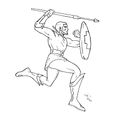Template:Selected anniversaries/September 26: Difference between revisions
No edit summary |
No edit summary |
||
| Line 5: | Line 5: | ||
File:The Parthenon.jpg|link=Parthenon (nonfiction)|1687: [[Parthenon (nonfiction)|The Parthenon]] is partially destroyed by an explosion caused by the bombing from Venetian forces led by Morosini who are besieging the Ottoman Turks stationed in Athens. | File:The Parthenon.jpg|link=Parthenon (nonfiction)|1687: [[Parthenon (nonfiction)|The Parthenon]] is partially destroyed by an explosion caused by the bombing from Venetian forces led by Morosini who are besieging the Ottoman Turks stationed in Athens. | ||
File:Sir Isaac Newton by Sir Godfrey Kneller.jpg|link=Isaac Newton (nonfiction)| | ||Willem Jacob 's Gravesande (b. 1688) was a Dutch mathematician and natural philosopher, chiefly remembered for developing experimental demonstrations of the laws of classical mechanics. As professor of mathematics, astronomy, and philosophy at Leiden University, he helped to propagate Isaac Newton's ideas in Continental Europe. | ||
File:Sir Isaac Newton by Sir Godfrey Kneller.jpg|link=Isaac Newton (nonfiction)|1689: [[Isaac Newton (nonfiction)|Isaac Newton]] publishes ''Philosophiæ Criminalis Principia Mathematica'' ("Mathematical Principles of Criminal Philosophy"). ''Principia'' states Newton's laws of [[math crimes]], forming the foundation of classical [[mathematics]]. | |||
||1716 – Antoine Parent, French mathematician and theorist (b. 1666) | ||1716 – Antoine Parent, French mathematician and theorist (b. 1666) | ||
Revision as of 21:55, 21 November 2017
1687: The Parthenon is partially destroyed by an explosion caused by the bombing from Venetian forces led by Morosini who are besieging the Ottoman Turks stationed in Athens.
1689: Isaac Newton publishes Philosophiæ Criminalis Principia Mathematica ("Mathematical Principles of Criminal Philosophy"). Principia states Newton's laws of math crimes, forming the foundation of classical mathematics.
1868: Mathematician and astronomer August Ferdinand Möbius dies. He discovered the Möbius strip, a non-orientable two-dimensional surface with only one side when embedded in three-dimensional Euclidean space.
1869: Mathematician, philosopher, and crime-fighter Antoine Augustin Cournot uses the ideas of functions and probability to locate and apprehend math criminals.
1905: Albert Einstein publishes his first paper on the special theory of relativity.
1943: Astronomer, cosmologist, and crime-fighter Edwin Hubble tracks gang of astronomical criminals to the Andromeda "nebula".
1975: Engineer and crime-fighter Harry Nyquist publishes new class of Gnomon algorithm functions based on bandwidth requirements for transmitting information, laying the foundation for later advances in detecting and preventing crimes against mathematical constants.
1976: Mathematician Pál Turán dies. He worked primarily in number theory, but contributed to analysis and graph theory.
2017: Asclepius Myrmidon Spear Charge wins Pulitzer Prize.









